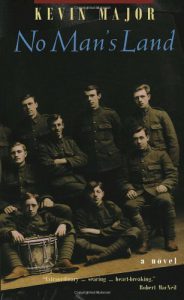 The Story
The Story
Set in France during WWI, No Man’s Land pulls us into the lives of the young men of the Newfoundland Regiment as they prepare to set out for the trenches and what will come to be known as the Battle of Beaumont-Hamel. Second Lieutenant Alan Hayward and his brash fellow officer Clarke, together with under-aged Private Martin, wait out the hours to the final whistle. Longing for their homeland, frustrated by the lack of knowledge about what lies ahead, they stand resolutely on the fire-steps as the officers’ pocket watches tick away to zero hour.
A classic war novel, the book is equally effective in its portrayal of the camaraderie and unnatural quiet before the storm, as it is in its graphic account of the fight to make it through the barbed wire and sweep of machine-gun bullets.
Close to three hundred of the 801 Newfoundlanders who went over the top on July 1, 1916 were killed. No regiment suffered greater loss. It remains the single greatest tragedy in the island’s history.
Reviews
“As a literary evocation of the Great War, No Man’s Land belongs on the same shelf as David Macfarlane’s The Danger Tree and Timothy Findley’s The Wars.” Toronto Star
“I thought No Man’s Land extraordinary for the searing, clear-eyed honesty of its approach. I was deeply moved. The simple but skilled construction creates an enormous accumulation of tension and foreboding towards an inexorable and heart-breaking conclusion. In obsessively reanalyzing the appalling, sometimes criminal foolishness of World War I, we may too easily dismiss the great hearts that fought it. This book will help us appreciate them afresh.” Robert MacNeil, PBS news anchor
Author’s Comments
The tragedy of the Battle of Beaumont-Hamel is deeply imbedded in the consciousness of Newfoundlanders. I felt a profound responsibility to do the story justice. By narrowing the time frame to roughly 36 hours – the last waking hours of Hayward and Clarke – and limiting the focus to a few characters, my aim was to help readers understand the nature of the companionship that holds fighting men so strongly together in war, and the personal devastation that results when the fighting goes awry. It is minimalist historical fiction, and I hope as affecting for what it leaves out as for what it includes.